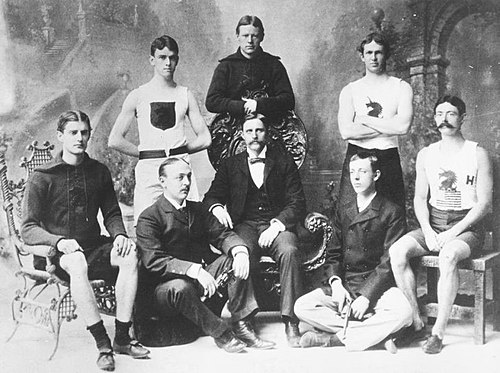
EARLY OLYMPIC: A Glimpse into America’s First Olympic Heroes of 1896:
Several members of America’s first Olympic team in 1896. Standing: T.E. Burke, Thomas P. Curtis, Ellery H. Clark. Seated: W.W. Hoyt, Sumner Paine, trainer John Graham, John B. Paine, Arthur C. Blake.
The first modern Olympic Games, held in Athens, Greece, saw the Americans fielding 14 athletes that competed in three sports. The hosts, on the other hand, had 169 athletes competing and won 46 medals
In the spring of 1896, a group of determined young American athletes made history as part of the first modern Olympic Games held in Athens, Greece. Among them were figures who would go on to set the standard for international competition and help lay the foundation of what the Olympics represent today.
Photographs from that era show several key members of the U.S. Olympic contingent: Standing tall are Thomas E. Burke, Thomas P. Curtis, and Ellery H. Clark. Seated beside them are Wellesley W. Hoyt, Sumner Paine, team trainer John Graham, John B. Paine, and Arthur C. Blake. Together, they formed a core part of the 14-member team that represented the United States at the rebirth of the Olympic movement after centuries of dormancy.
While the host nation, Greece, boasted a formidable lineup of 169 athletes and ultimately took home 46 medals, the Americans punched far above their weight. Competing in just three sports—track and field, shooting, and tennis—the U.S. team still managed to dominate in several events, introducing the world to their athletic prowess.
One of the standout performers was Thomas Burke, who won gold medals in both the 100-meter and 400-meter sprints. Known for his innovative crouching start, Burke’s technique gave him a clear edge over the field and forever changed the way sprinting events would be approached.
Another star was Ellery H. Clark, who became the first Olympic champion in both the long jump and high jump. His achievements were a testament not only to personal skill but to the broader spirit of amateur athleticism that defined the early Olympic ethos.
In the shooting events, brothers John B. Paine and Sumner Paine dominated the military pistol competition. After John B. Paine won the preliminary rounds, he gracefully stepped aside to let his brother Sumner take the gold in the final—a demonstration of sportsmanship rarely seen in modern competition.
Thomas P. Curtis brought further glory by winning the 110-meter hurdles, while W.W. Hoyt added to the medal tally with a strong performance in the pole vault. Arthur C. Blake also competed in the 1500 meters, placing second in a field that tested the endurance of even the most seasoned athletes.
These men, under the guidance of trainer John Graham, had traveled across the Atlantic not with the high-tech gear or vast support systems seen today, but with raw determination and a belief in the Olympic ideal. Many had funded their own travel or relied on university sponsorships, primarily from Harvard and Princeton.
The 1896 Olympics may have been modest by today’s standards, but its legacy is immeasurable. For the American team, it marked the beginning of what would become over a century of Olympic excellence. Their courage, sportsmanship, and performance in Athens were not only groundbreaking but deeply symbolic of the unifying power of sport.
Today, these early Olympians are remembered not just for their medals but for their pioneering spirit that helped revive one of humanity’s most celebrated traditions.
Be the first to comment